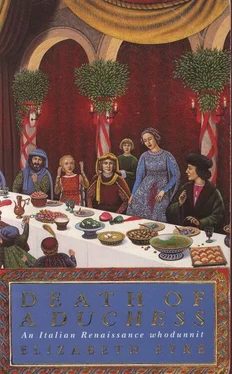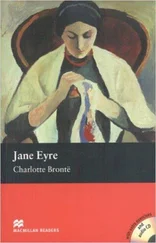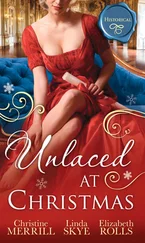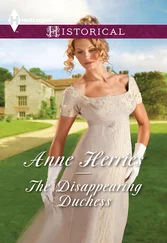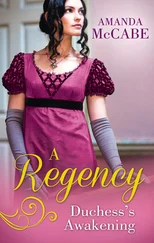Elizabeth Eyre - Death of a Duchess
Здесь есть возможность читать онлайн «Elizabeth Eyre - Death of a Duchess» весь текст электронной книги совершенно бесплатно (целиком полную версию без сокращений). В некоторых случаях можно слушать аудио, скачать через торрент в формате fb2 и присутствует краткое содержание. Год выпуска: 0101, Жанр: Исторический детектив, на английском языке. Описание произведения, (предисловие) а так же отзывы посетителей доступны на портале библиотеки ЛибКат.
- Название:Death of a Duchess
- Автор:
- Жанр:
- Год:0101
- ISBN:нет данных
- Рейтинг книги:5 / 5. Голосов: 1
-
Избранное:Добавить в избранное
- Отзывы:
-
Ваша оценка:
- 100
- 1
- 2
- 3
- 4
- 5
Death of a Duchess: краткое содержание, описание и аннотация
Предлагаем к чтению аннотацию, описание, краткое содержание или предисловие (зависит от того, что написал сам автор книги «Death of a Duchess»). Если вы не нашли необходимую информацию о книге — напишите в комментариях, мы постараемся отыскать её.
Death of a Duchess — читать онлайн бесплатно полную книгу (весь текст) целиком
Ниже представлен текст книги, разбитый по страницам. Система сохранения места последней прочитанной страницы, позволяет с удобством читать онлайн бесплатно книгу «Death of a Duchess», без необходимости каждый раз заново искать на чём Вы остановились. Поставьте закладку, и сможете в любой момент перейти на страницу, на которой закончили чтение.
Интервал:
Закладка:
The procession of Venus withdrew, while the doves flapped in the roof or landed among the food and were impounded by servers. The next course came in, to a burst of music: heron; a cockatrice compounded of the rear of a pig and the front half of an immense capon, sewn meticulously together and nestled in vegetables; large fish so ornamented with rosettes of sauce that their disguise was absolute; hens that were mere chicken skins moulded over the boned meat and stuffing; and game pies and hares in wine.
The next entertainment arrived to a roll of drums and a continued clash of tambourines. The Florentine hired by the Duchess was still concerned with classical or nuptial allusions, but had also used what came to hand. The curtains, hoisted high this time, admitted a ship, the height of a man and the length of two, with curved monstrous prow, turrets either end and a sail of white silk. The clash and roll and the martial trumpets covered the trundling of its wheels as a team of Tritons, green-wigged and in tunics sewn with shells, nets and weed, propelled it forward. The welcome this received was doubled when a second ship appeared, and when it was happily perceived that both were manned by dwarves and there was to be a battle by sea.
The Florentine had suffered no lack of material. Duke Ludovico’s father had collected avidly in two categories: Greek manuscripts, and dwarves. He had collected them until the city very likely contained more than any in Italy save perhaps Ferrara. The old Duke had enviously eyed the tiny apartments custom-built for the Ferrarese dwarves at the top of the palace, and had put in hand a copy of this at Rocca, with improvements, just before his death. His son, although proud of his dwarf collection, was more interested in building a new library to house his books.
This interlude proved a succès fou . The Lady Cecilia’s husband had to be rescued from choking on his wine when a dwarf, hurling a gilt spear at the opposing ship, fell out of the turret and damaged himself on a Triton. There were explosions from minute guns, which set the alarmed doves clattering about in the roof. The diners participated warmly, not only urging on the warriors but throwing chicken legs and bread, or scoring with a well-aimed jelly. It was thought high time to trundle the ships out again, the bespattered dwarves still shrieking, bellowing and posing martially upon the decks, some working off a grudge or two by getting down to some serious fighting, others bowing thanks for the food, eating it off their or others’ persons, and searching the planks for the coins that had also been thrown.
The smell of gunpowder was dispersed by a short visit from the nymphs scattering scent. The doves in the roof slowly settled again, peering from the painted beams and once more risking descent to the tables.
The next course contained more sweetmeats than before – white gingerbread of marzipan ginger-flavoured and gilded, red gingerbread spiced with cinnamon and coloured with wine and sandalwood. The roar of talk by now almost obliterated the musicians’ efforts, and only a reedy sound came down. Cups were filled and refilled. There were dishes of spiced cream, of ground almonds jellied and variously tinted, with whole nuts and a sauce of wine, and candied fruits. There were jelly ponds with orange fish and angelica reeds; eggs in hens’ nests of shredded lemon peel, lambs of whipped cream upon little hills of jelly.
A dove made the error of descending in front of Sigismondo, and was impounded so instantly that his neighbours jumped and cried out. He offered it to a server hurrying by with an empty dish, but the boy made a difficulty over taking hold of it. From behind, Benno said, ‘Let me, sir,’ and took the dove in willing wine-stained hands.
At this stage of the feast, the guests had all but forgotten the shadows of the Duke’s anger that had lowered over the start. They were reminded of the savage nature that lurks in all humankind by the next diversion. To a discordant squeal of music, two lines of dwarves, possibly those from the sea battle, possibly spares, burst through the curtains, getting tangled on purpose in their folds, and fanned out, carrying with exaggerated effort two long chains ending in a collar round the neck of a Wild Man, whose mask was more sad than savage. Shaking shaggy arms and making a dismal roar, he capered at the centre, pretending to wrestle with his collar and shrinking in mock terror when dwarves at the rear cracked whips at him.
A moment’s hesitation came, when some of the dwarves were seen to glance at one another, nudge and argue, the next move uncertain, or as if the dwarf responsible for it was absent. The Wild Man solved the problem by falling on his knees before the Duke, grovelling in tribute and holding out his furry hands for pardon. The Duke, smiling, signalled to him to rise and he, springing to his feet, tore at his collar and broke it apart in triumph. The dwarves, apparently pulling on the chains to control him, now fell over. One line managed to keep the domino effect, the other failed and tumbled in shrieking heaps. One of the guests laughed part of his dinner back onto his plate.
The Wild Man, now free, crouched and stared round. He made little rushes here and there, the dwarves getting to their feet and running from him shedding whips, hats and bits of chain, taking refuge behind the servers, behind curtains and under the tables where they caused havoc among the ladies’ skirts.
The Wild Man now heard the music for the first time, cupping his paw behind his ear. The dwarves hushed, the diners hushed. The harp rippled, the clavicembalo’s sweetest tones charmed. The Wild Man’s movements became gentle. The dwarves emerged and danced, and he made humble efforts to copy them, became increasingly confident, and leapt about. In his happy dance he appeared of a sudden to see the Duchess. He pressed his hands to his eyes as though blinded, then with a bound of dreadful agility he was poised on the high table itself among the cups and dishes. The Lady Cecilia, either frightened or offended that the Wild Man’s head was turned towards the Duchess and not the bride, shrieked so loudly that she could be heard above the dwarves’ renewed clamour.
The Duchess, on the contrary, applauded and the Wild Man began to curvet among the plates with delicate skill, touching nothing, keeping time to the music. The dwarves, reassured as to his tameness, crept closer to watch. Bending low before the Duchess and putting his head wistfully to one side, the Wild Man drew from the bosom of his costume a heart of red satin which he held out to her. The Duchess, with an amused smile, took it, and as he sprang up in joy his furred foot – alas – struck the Duchess’s goblet, sending it flying. Wine flooded across the cloth and onto her silver brocade. There was a general gasp, the harpist stopped, the Duchess was on her feet.
All the guests of course rose, a bench overturned, and stewards ran forward with their wands to deal with the Wild Man. He had already sprung backwards from the table and now cowered and howled, his arms over his head. The Duchess could be heard commanding the stewards not to beat the poor savage, and she was laughing. She asked the guests to be seated, and a rustle all through the hall followed her order. She spoke to the Duke and to the Lady Cecilia, and withdrew. While she was going to change her dress, the bride was not to wait on her this evening.
The Wild Man ran from the hall, still desolately howling and followed by the dwarves, hurling after him their hats and whips and entering into the improvisation with gusto. Music picked up again, servers quickly mopped and put fresh linen cloth at the Duchess’s place, her goblet was wiped, restored and refilled. Some tumblers ran in. The Lord Paolo now, after a word with the Duke, helped his son from his chair among his cushions and, refusing help from the servants, took him up in his arms. The Lady Violante leant across to enquire after her cousin, and was reassured as the boy smiled at her. He was carried out, amid a perfunctory murmur of concern, and admiration of the careful father. One of Sigismondo’s neighbours became maudlin on the subject.
Читать дальшеИнтервал:
Закладка:
Похожие книги на «Death of a Duchess»
Представляем Вашему вниманию похожие книги на «Death of a Duchess» списком для выбора. Мы отобрали схожую по названию и смыслу литературу в надежде предоставить читателям больше вариантов отыскать новые, интересные, ещё непрочитанные произведения.
Обсуждение, отзывы о книге «Death of a Duchess» и просто собственные мнения читателей. Оставьте ваши комментарии, напишите, что Вы думаете о произведении, его смысле или главных героях. Укажите что конкретно понравилось, а что нет, и почему Вы так считаете.
